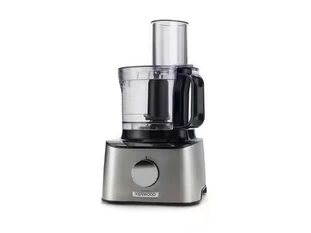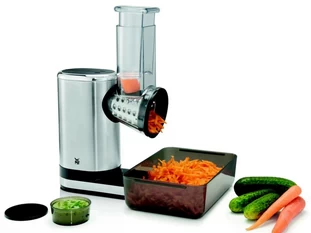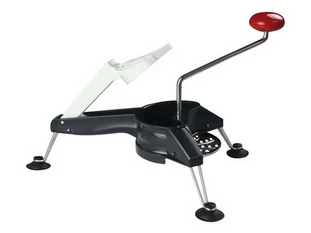This site uses only a few technical cookies necessary for its operation. By continuing to browse, you accept their use.
To find out more...
To find out more...
It's spinning too fast!

When you need to grate or slice vegetables, you generally use an electric machine that does all the work: a food processor, a mixer with a "slicer" extension or similar.
Are these machines really suitable? Generally speaking, yes of course, but there's one criterion that often poses a problem, and that's speed.
Are these machines really suitable? Generally speaking, yes of course, but there's one criterion that often poses a problem, and that's speed.
12 K 5/5 (2 reviews)
Keywords for this post:EquipmentGratingBeatingKneadingSpeedRotationLast modified on: November 12th 2023
It's spinning too fast!
It happens very, very often in the kitchen, when you need to grate, julienne or slice vegetables for one of your recipes.
You wash them, peel them, and then run them through one of your machines using the right disc or grater.
We all do this, and it's only natural, after all: it's super-fast, super-convenient and relatively efficient.
Many of us use what in France is called a "robot-coupe", or equivalent, a food processor with a simple electric motor and cutting discs of various sizes.
Granted, it works very fast - it takes 2 or 3 seconds to grate a carrot, for example - but it has an annoying tendency to sometimes rough up the vegetables, and to make carrot purée and juice at the same time as it grates - you'll find a bit of this at the bottom of the machine's bowl. This is even more pronounced with tender vegetables such as zucchinis or cucumbers.
This isn't too bad for a simple carrot salad, you may say, but you have to admit that what is grated with this tool is necessarily in very, very small, very fine pieces, and sometimes this isn't great for the recipe and its texture.
The problem is that the food processor runs too fast, much too fast for this job, and therefore produces this "purée" effect, which is a bit painful.
It's almost impossible to reduce the speed of the machine (I've tried using a variable speed drive on mine), it starts to work badly, so what can you do?
Well, you "still" have to buy a new electric machine, which takes up a lot of space, but it's a good option.
To sum up: conventional food processors run too fast when cutting or grating vegetables, and are far less efficient than a dedicated vegetable grater that "spins" much more slowly, or even better, a simple and economical hand grater.
You wash them, peel them, and then run them through one of your machines using the right disc or grater.
We all do this, and it's only natural, after all: it's super-fast, super-convenient and relatively efficient.
Many of us use what in France is called a "robot-coupe", or equivalent, a food processor with a simple electric motor and cutting discs of various sizes.

Granted, it works very fast - it takes 2 or 3 seconds to grate a carrot, for example - but it has an annoying tendency to sometimes rough up the vegetables, and to make carrot purée and juice at the same time as it grates - you'll find a bit of this at the bottom of the machine's bowl. This is even more pronounced with tender vegetables such as zucchinis or cucumbers.
This isn't too bad for a simple carrot salad, you may say, but you have to admit that what is grated with this tool is necessarily in very, very small, very fine pieces, and sometimes this isn't great for the recipe and its texture.

The problem is that the food processor runs too fast, much too fast for this job, and therefore produces this "purée" effect, which is a bit painful.
It's almost impossible to reduce the speed of the machine (I've tried using a variable speed drive on mine), it starts to work badly, so what can you do?
The alternatives

Well, you "still" have to buy a new electric machine, which takes up a lot of space, but it's a good option.

To sum up: conventional food processors run too fast when cutting or grating vegetables, and are far less efficient than a dedicated vegetable grater that "spins" much more slowly, or even better, a simple and economical hand grater.
Lasts posts
XO Cognac Explained: Meaning, Aging, and Flavor Profile
XO Cognac always goes beyond the labels on the bottle: it is often associated with tradition and quality. You get to appreciate the artistry, character and ageing process when you understand what defines this smooth Cognac. The section below tackles everything about XO Cognac, from complex flavour...January 28th 20261,040 Sponsored article
Butter vs. grease
We often read in a recipe where a pastry is put into a mould that, just before pouring, the mould should be buttered or greased. But what's the difference between these 2 terms?December 1st 20252,6565
Getting out of the fridge early
Very often when you're cooking, you need to take food or preparations out of the fridge, to use them in the recipe in progress. There's nothing tricky about this: you just take them out of the fridge and use them, usually immediately, in the recipe. But is this really a good method?November 24th 20251,7035
Who's making the croissants?
When you look at a bakery from the outside, you naturally think that in the bakery, the bakers make the bread, and in the laboratory, the pastry chefs make the cakes. It's very often like that, with each of these professions having quite different ways of working, but sometimes there's also one...November 23th 20251,554
Oven height
When we put a dish or cake in the oven, we naturally tend to put it on the middle shelf, and that's what we usually do. But in some cases, this position and height can be a little tricky, so let's find out why.October 8th 20255,2635
Other pages you may also like
Raising (or leavening) agents
When we want to make a dough or batter rise when baking, either in patisserie or bread-making, we need to use a raising agent or leavening agent, one of which is called leaven. In the context of baking, a raising agent is simply what "makes something rise". It is a substance which, when added to...June 16th 202158 K4.8
The march forward
When professionals get to work in their kitchen, lab or bakery, they are (if they are conscientious) very sensitive to hygiene and cleanliness. It is impossible for a good baker for example to do a day's work without regularly cleaning the table where he or she works, and it is even more...June 30th 202120 K5
The bitterness of endives
As I write these lines, we are entering the endive season, and if you like it, it's time to enjoy it, if possible with your local producers. Endive is good, but the reproach that is often made of it, and children in particular, is: "It's bitter! And it is (somewhat) true of course, endives...February 9th 201915 K4.9
The right way to cook potatoes
If you simply boil them (not steam them), or bake them in the oven, at some point you will have to ask yourself the question "are they well cooked?".March 23th 202017 K4.7
Circles vs. moulds tins
If you like to bake or make quiches, pies etc. you must surely have one or more pie pans at home, in different diameters and perhaps materials. They are indispensable, without them there is no way to make beautiful pies, and they work very well, but you have another option, instead of moulds,...October 2nd 202017 K5
Post a comment or question
Follow this page
If you are interested in this page, you can "follow" it, by entering your email address here. You will then receive a notification immediately each time the page is modified or a new comment is added. Please note that you will need to confirm this following.
Note: We'll never share your e-mail address with anyone else.
Alternatively: you can subscribe to the mailing list of cooling-ez.com , you will receive a e-mail for each new recipe published on the site.









